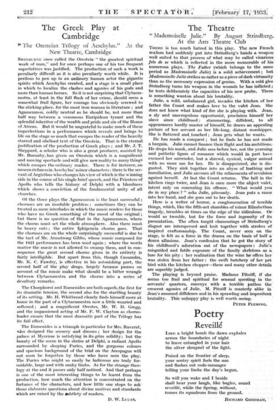The Greek Play at Cambridge
$€ The Oresteian Trilogy of Aeschylus." At the New Theatre, Cambridge SWINBURNE once called the Oresteia "the greatest spiritual work of man," and for once perhaps one of his too frequent superlatives was justified. The production of such a work is peculiarly difficult as it is also peculiarly worth while. It is perilous to pen up in an ordinary human actor the gigantic spirits which Aeschylus created, and a stage is a small place in which to localize the clashes and agonies of his gods and more than human heroes. So it is not surprising that Clytaem- nestra, at least in the full flush of her crime, should seem a somewhat frail figure, her courage too obviously screwed to the sticking-place, for the most iron woman in literature ; and Agamemnon, coldly neutral as he should be, not more than half way between a venomous Euripidean tyrant and the splendid inheritor of the wealth and pride and sin of the House of Atreus. But it would be ungrateful to make much of these imperfections in a performance which reveals and brings to life on the stage so much that escapes the reader of the heavily starred and obelised text of the Oresteia. That is the eternal justification of the production of Greek plays ; and Mr. T. T. Sheppard, a scholar who is also a great producer, assisted by Mr. Burnaby, has given an Oresteia which is a magnificent and moving spectacle and will give new reality to many things which escapes the ordinary reader. There is for instance, an unseen richness in Aeschylus' minor characters ; there is the ser- vant of Aegisthus who changes his view of which is the winning side in the course of his single brief speech, and the Priestess of Apollo who tells the history of Delphi with a blandness which shows a conviction of the fundamental unity of all churches.
Of the three plays the Agamemnon is the least successful ; choruses are an insoluble problem ; sometimes they can be treated as mere interludes in which the music renders for those who have no Greek something of the mood of the original ; but there is no question of that in the Agamemnon, where the chorus must set the whole atmosphere. Also there must be heavy cuts ; the entire Iphigeneia chorus goes. That the choruses are on the whole surprisingly successful is due to the tact of Mr. Armstrong Gibbs, whose music composed for the 1921 performance has been used again ; where the words matter the music is not allowed to swamp them, and in con- sequence the great second chorus given in its entirety is fairly intelligible. But apart from this, though Cassandra, Mr. K. C. Fawdry, is effective in his astonishing part, the second half of the play drags, largely because pauses on account of the music make what should be a bitter wrangle between Clytaemnestra and the chorus into a series of desultory remarks.
The Choephoroi and Eumenides are both superb, the first for its dramatic tension, the second also for the startling beauty of its setting. Mr. H. Whitbread clearly finds himself more at home in the part of a Cly-taemnestra now a little wearied and softened ; and a magnificent Orestes, Mr. W. D. Gregg, and the impassioned acting of Mr. F. W. Clayton as chorus- leader ensure that the most dramatic part of the Trilogy has its full effect.
The Eumenides is a triumph in particular for Mrs. Raverat, who designed the scenery and dresses ; her design for the palace at Mycenae is satisfying in its grim solidity; but the beauty of the scene in the shrine at Delphi, a radiant Apollo surrounded by sleeping Furies, and the gorgeous colours and spacious background of the trial on the Areopagus will not soon be forgotten by those who have seen the play. The Furies who might so easily be ludicrous are truly for- midable, large and with snaky limbs. As for the strange theo- logy at the end it passes only half noticed. And that perhaps is one of the most interesting things to be learnt from the production, how much the attention is concentrated on the fortunes of the characters, and how little one stops to ask those elaborate questions about divine motives and standards which are raised by the aubtlety of readers.
D. W.






































 Previous page
Previous page